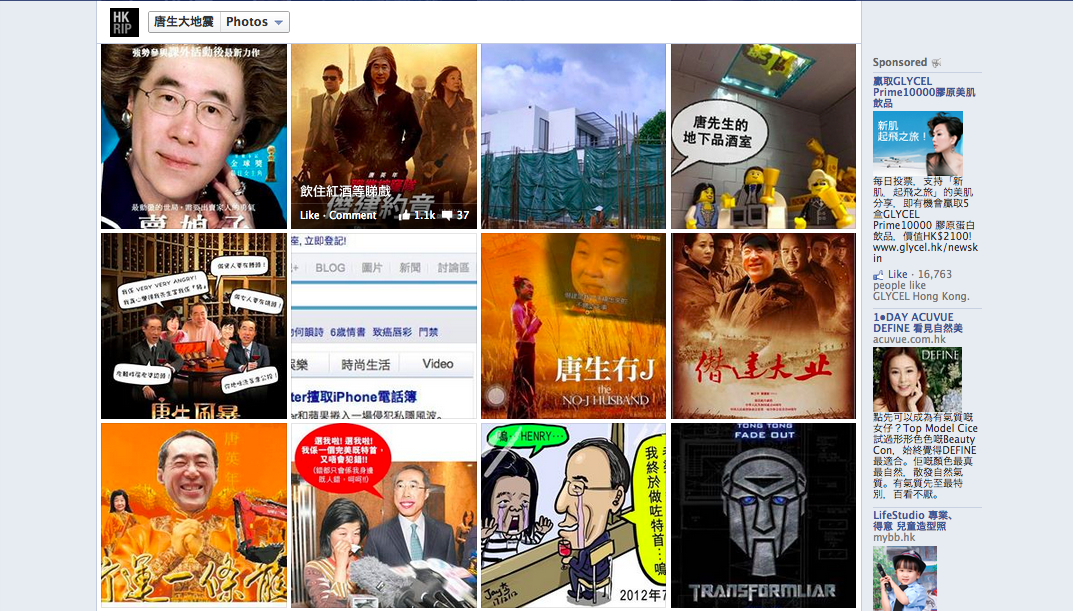In Hong Kong, political parodies under threat


HONG KONG -- In early 2012, leading up to the heated election of Hong Kong’s leader, the level of engagement in local politics seemed to hit a high, with the public focused not only on which candidate should win but also on the public’s lack of the right to vote.
Many instead turned to denouncing all of the candidates, as well as the undemocratic system that only allowed a powerful electorate of 1,200 to choose the leader.
That was when fake movie posters started to flood social media.
Parody movie posters were used not only to voice public frustration and reflect the populist mood but also to ridicule the missteps of the candidates. Plastered all over Facebook and online forums were altered posters of the most recognizable blockbusters of the time, with actors’ faces replaced by the candidates’, and titles and tag lines cleverly tweaked to reflect the contentious issues and embarrassing gaffes as the campaigns went on.
“Young people don’t necessarily pay attention to everything going on, but if you have these interesting posters or parodies, they may forward them to their friends, maybe just because they think it’s funny. But it also has the effect of making them pay more attention to the news,” says Anna Cheng, a member of the Concern Group of Rights of Derivative Works.
“At the very least they know there is an election going on. When their Facebook feeds are awash with those parody posters, it’s impossible not to know,” Cheng said.
But parodies like these have come under threat with a proposed amendment to copyright laws that could bring criminal liabilities for creators of parodies using copyrighted works. And it is not just with movie posters; other examples include pop songs played over news footage that give the lyrics a new interpretation and movie clips where the dialogue is dubbed over to create humorous commentary.
Countries around the world have been grappling in recent years with laws specifically regarding parodies. The United Kingdom is in the midst of introducing such provisions, while Australia is refining its laws. The U.S. provides exceptions for parodies under fair use, which are decided on a case-by-case basis.
Designers, cartoonists and other activists are concerned that placing legal limits on parodies is an encroachment on free speech by encouraging self-censorship, a concern that is closely watched in Hong Kong, where the public is on constant alert to the freedom suppressions that are associated with Mainland China.
While part of China, Hong Kong has a separate political and legal systems from the rest of the country. But without universal suffrage, the public turns to protests and other ways of voicing complaints. Those who are against the outlawing of parody works say they are an effective way of getting the public interested in political issues, especially among young people.
“Viewers or Internet users are not inclined to read a lot of words, like with an essay for example,” Cheng said. “If you have images, it’s easier to absorb the message. Also if it’s something that they are already familiar with, like a film poster with small changes, it’s easy for them to get the meaning when they see it.”
An updated copyright bill was originally intended to address new concerns in the digital age, but questions over parody were raised by the public. The current consultation process involves deciding whether to implement a fair dealing exception from civil and criminal liability for parody works.
A government document reads: “While some copyright owners have no objections to the exemption of parody from the criminal net, they are concerned that a new copyright exception for parody would adversely affect their legitimate interests.”
Clera Chu, a representative of an advocacy group for copyright holders, said at a discussion forum in August that copyright laws protect and encourage creativity, and that there should be no exemption from legal liability for commercial use of any copyrighted works for parodies.
But she also said that non-commercial use of such works would not cause any legal issues.
“Stop saying, ‘I’m very scared that if I’ll use something, I’ll be sued and someone will come arrest me,’” she said. “From the beginning, we copyright holders have said there is no such thing. If it’s for non-commercial use, it will not bring legal charges.”
Photo: Facebook
This post was originally published on Smartplanet.com